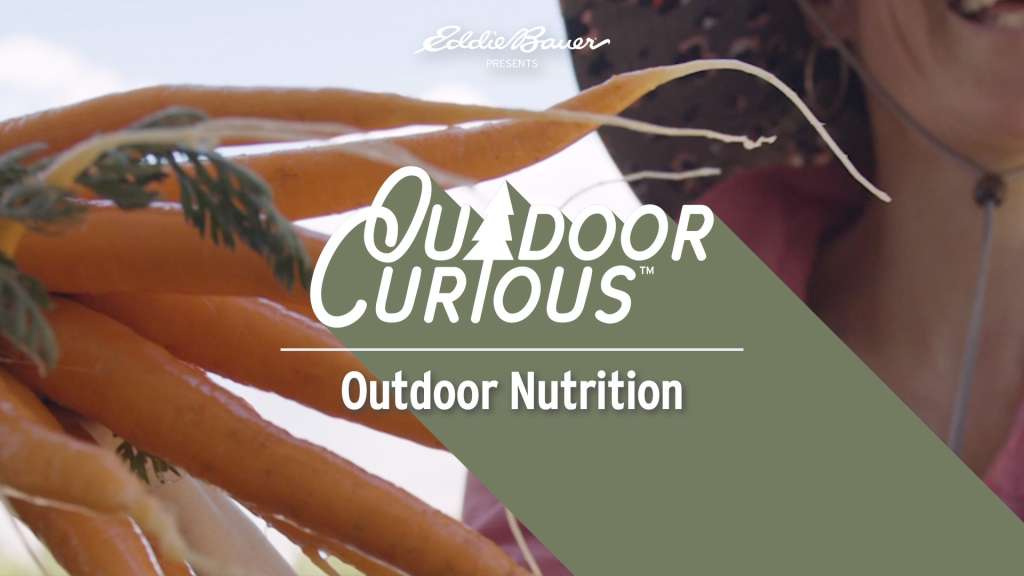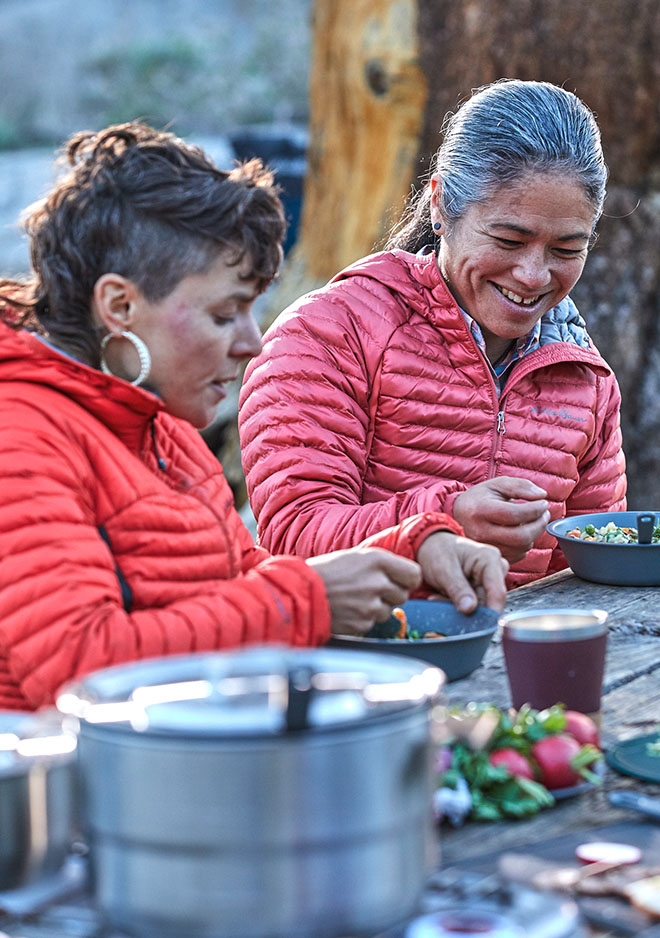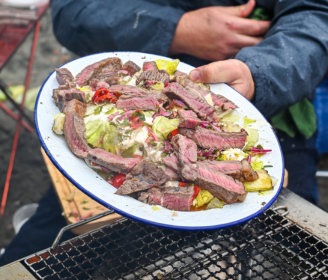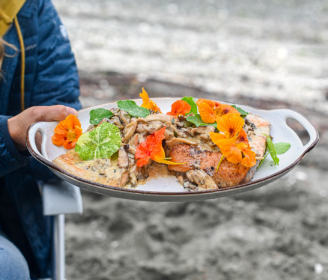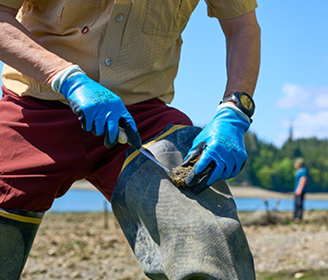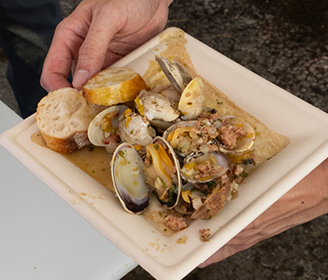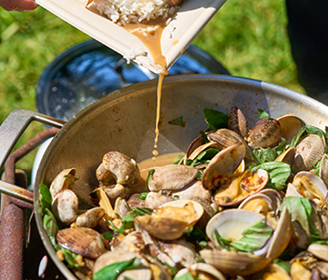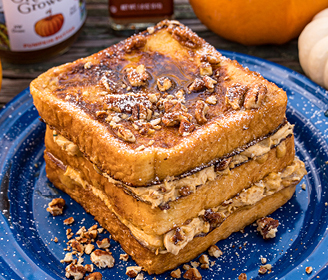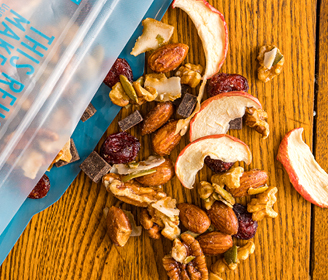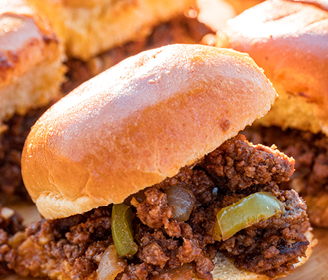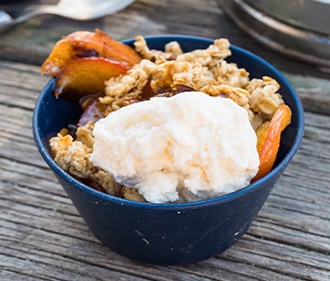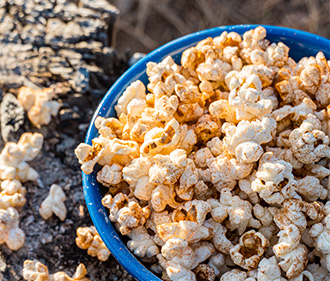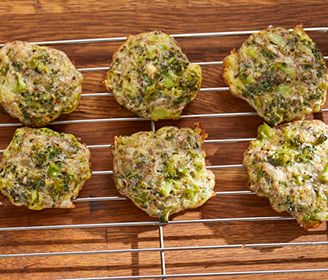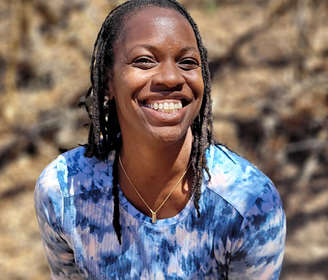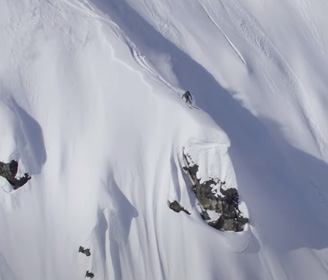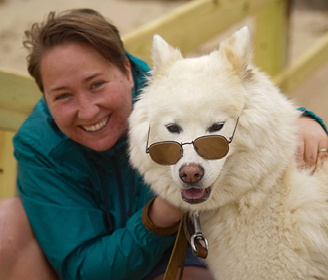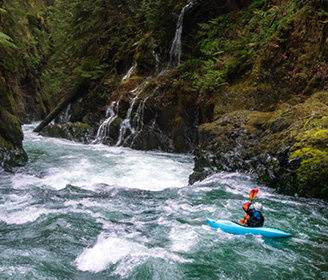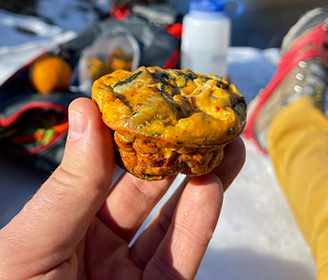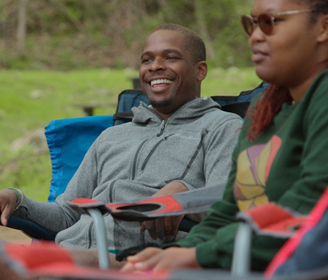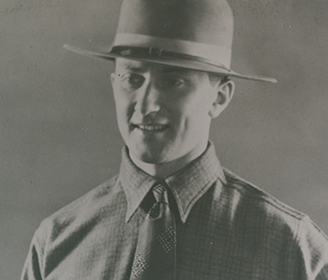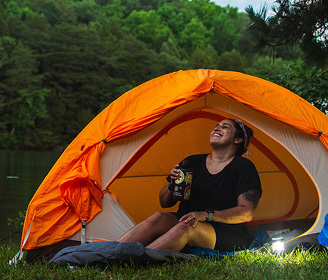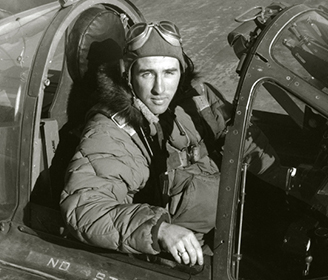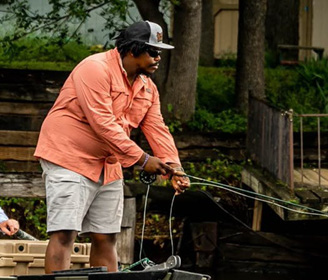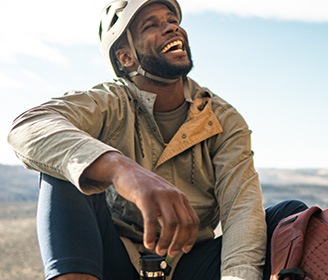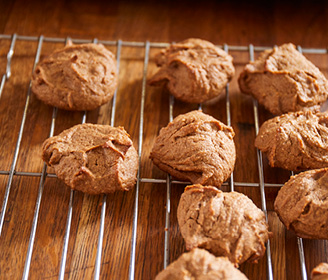Want to know some tips for properly fueling your adventure? Are you curious to know if a calorie is just a calorie? Eddie Bauer rock athlete and nutritional therapist Katie Lambert is here to answer the internet’s most asked questions about outdoor nutrition in this episode of Outdoor Curious™.
00:34 – What does the diet of an outdoor enthusiast look like?
I guess a lot of times you see people that are like hiking or climbing, kayaking, biking, et cetera with you know, like easy to carry items, like bars or gels or goos, and that’s all well and good, but you know, you can also have like real food. You could make your own granola bars, you could make sandwiches, you could make burritos, rice bowls. I always advocate for real food substances, so if you can find things that are easy to carry, that consist of real food that you like, even like nuts and dates, fruit, stuff like that.
01:15 – What should you eat the night before a big ski tour, climbing day, long hike, trail run, et cetera?
Nutrition’s super important basically all the time, not just pre- and post-workout, but like during your workout or leading up to the days that you’re going to do something. Probably going to sound like a broken record a little bit but real food, whole food, whole grains, you know, vegetables, meat, things like that are really good, so let’s say you’re like going out on your big ski tour, the night before, having something like a chicken breast with steamed broccoli, even like kimchi, and maybe some millet or something like that, or a little side salad, that would be ideal. You don’t want to party hard, meaning like you don’t want to eat a whole bunch of simple carbohydrates, a bunch of cake, ice cream, drink a bunch of alcohol. It’s just gonna lead to one, probably an upset stomach, two, you’re not gonna sleep well, three, as a result of that, you’re gonna have some inflammation and you’re not gonna feel that great.
02:23 – How often should you eat throughout the day during your chosen activity?
We’re all different, we’re bio-individuals, so it varies how much each person should eat or might need to eat. It also depends on the exercise, right? But trying to keep your blood sugar under regulation, and keep energy at the same time. You don’t want these like peaks and valleys with your nutrition ’cause it’s gonna hinder your performance and disrupt your energy levels. So if we can eat kind of a steady diet throughout the day for sure, first meal of the day is super important, so you want to kind of focus on in general, 40-30-30, 40% of your daily intake is complex carbohydrates, 30% is protein, 30% is really good fat. So for your breakfast, you know, you could have something that’s say, like a potato and bell pepper stir fry with some eggs and maybe a side of toast lathered in butter. That would be great, that’s gonna give you some long-sustaining energy for awhile. And then let’s say you’re just going out cragging, you’re gonna go do a few pitches and maybe you’ll be gone for six hours. You could pack a lunch of whatever you like, you know, but making sure that you’re staying within the 40-30-30, and then you don’t want to just sit down and eat that whole lunch and then try to climb, because that’s not gonna work. We don’t want all of our blood flow going to digestion, ’cause we’re still trying to , so you know, you can kind of just snack throughout the day on that. And then of course when you get home, making sure you prioritize getting some protein in there and some good carbohydrates and fat too.
04:03 – What are the best foods to fuel a backpacking trip?
You know, you want to think of light food. You can do your own dehydrated meals, you can buy bulk dehydrated meals. Depending on if you’re going to have a water source or not will kind of dictate how much of something you can carry, right, because if you’re not gonna have a water source, and you have to carry all of your water with you, and you have to think about do you need that water for your food to rehydrate it or can you have water where you’re going, if you’re going backpacking and there’s some lakes, you can use that water, you can rehydrate your foods so you don’t have to carry the water. Things like that are really important to consider. Big wall climbing, you are probably, you’re hauling all of your stuff with you, you need a lighter, you know, haul bag, water’s heavy, you also don’t want to carry like cans and packs of wet food. So it’s a fine balance, you have to ask yourself like how much water am I gonna need for my meals, how much water am I gonna need for just general hydration. If you, you know, don’t have access to water, bringing things like Tasty Bites, if y’all have heard of that, it’s like these cellophane packs, it’s things like curry, beans and rice, stuff like that that doesn’t need water to get reconstituted. Also it’s important to have things that get you psyched, so like if you need a sweet treat, like sour gummies, bring it with you.
05:33 – Is it better to eat a few large meals or should I graze throughout the day?
It’s gonna kind of depend on you and what your day is. If you’re just at home working, well maybe having breakfast, a snack, and lunch, and dinner is fine, but if you’re like out, right, it’s an active day. If you’re going for a hike, maybe just having, you know, like a little side pack of some trail mix, some nuts, you know, maintaining that fat, protein, carbohydrate ratio is really important. That keeps us at an even keel and powered throughout the day.
06:08 – What can I eat for a quick burst of energy to get me through the ascent?
The two easiest forms of like fast-acting sugar, basically from real food are raisins and grapes. They’re amazing, they’re super easy to carry, especially raisins.
06:26 – Isn’t a calorie just a calorie? Shouldn’t I pack for efficiency?
That’s a really common question, and no, you know what? A calorie is not just a calorie. Energy-wise, yes, calorie is the same. They burn the same amount of energy. However, it’s in the metabolism of that calorie where the differences are, and then in the effects of that. So for example, back to the sour gummies, sour gummies might have the same amount of calories as, say, an apple, but the sour gummies has no fiber and it’s all sugar, so we’re going to eat it, it’s gonna be very fast acting, like shot of straight glucose, our blood sugar’s gonna spike, it’s gonna be fun for a little while, we’re gonna love it, but then we’re gonna have one of those you know, big you know, declines in our blood sugar or big valley. The apple has fiber, we’re going to tap into that fructose, it’s gonna take a little longer to process because of the fiber and it’s gonna keep our blood sugar more stable. Both affect our hormones. We’re trying to not affect hormones negatively as much as possible. So yeah, you do want to think efficiency, but you need to think about the efficiency of your body also, that’s super important. You can be efficient with real food, getting back to the dehydrated types of meals.
07:35 – What are signs of not eating right while being active?
Well, fatigue, number one. Fatigue and not recovering fast enough. If you’re getting aches and pains, if you’re constantly sore, you feel like you just don’t have the energy, you don’t have the power to do it, you’re definitely not fueling enough.
08:03 – How much food should I bring outdoors?
That depends on your objective, how long you’re going out for. If you’re going out for the day, maybe just bring about 1,500 calories with you, assuming that you’re going to be home for dinner or that you’ve already eaten breakfast at your house. If you’re going out for multiple days and you want to think with this minimum of 2,000 calories per day, it’s gonna be different per person, generally speaking because the bigger you are, the more you’re exerting, the more calories you need. Also, the type of exercise you’re doing is gonna determine how much you’re burning. So a baseline of 2,000 per day, and then you kind of go from there.
08:46 – Best advice for vegetarians who want to follow a high-protein diet?
Well, beans obviously are super important. If you’re going with tofu or the soy route, it’s really important that you prioritize going for sprouted or fermented. Those are the traditional ways that soy was produced, that is the way that we digest it the best, otherwise we have a hard time. That’s basically with all beans and legumes, but soy in particular. And you know, you need to make sure you’re getting all nine essential amino acids, however you’re going to do that. Seaweed’s become a really popular, really good way to do that.
09:25 – What are some of your food staples you always have with you?
Well I always have pecans, I always have apricots, dried apricots, that is, I always have dates, I always have dried figs and cheese. That is like, I always have that stuff. No matter where I am or what I’m doing. I do also have a guilty pleasure treat, which is any sort of nut butter chocolate cups, so like sunflower seed butter cups, or almond butter cups, you know, Reese’s Pieces, if I can’t find something like organic and fancy, yeah. It’s definitely my weakness.
10:05 – I’m lazy and hate to cook. How can I bring healthy foods with little to no effort?
You know, it takes some effort, you need to put in some effort. You could buy, you know, pre-made little package meals, like I was saying, the Tasty Bites, or I think Lotus Flower Foods has some dehydrated stuff. Yes, need to optimize for getting pre-packaged goods that are real foods, and you can get that stuff generally at any kind of health food store that’s around you, even you know, the big-box grocery stores these days have a lot of that stuff.
10:39 – Tips for proper hydration while being active?
General rule of thumb for hydration is, and this goes for everyone across the board, is you want to get half of your body weight in ounces in non-caffeinated beverages a day. Also, I should say non-alcoholic. I say beverages because it’s not just water. Hydration’s not just about water, it’s also about electrolytes. you need electrolytes every day, and then even more so when we’re sweating or exerting ourself, and then make sure that you’re, you know, if that’s just gonna be water, well then make sure you’re getting your electrolytes either from like a real sea salt or even like powders. There’s a variety of powders. The thing you want to watch out for is high sugar. And then also, let’s say you’re doing aerobic work, I think the general rule of thumb for that is about every 30 minutes of aerobic exertion, so let’s say you are hiking into the back country to go alpine climbing, it’s a long approach, you’re sweaty, you know, you need about 12 ounces of fluid per half hour.
11:48 – What is good recovery food for your post-adventure?
It’s gonna go back to optimizing for real food, you know, but prioritizing protein. So within the first hour after you’re done with whatever it was, it’s really good to have about 20 grams of protein, but then you know, you need your other, you need your vitamins and your minerals and your fats with it too, so getting that good source of protein, having some nice vegetables with that and some good fat with it too is ideal. I really like, and people are gonna like crinkle their nose at this, but like liver and onions, one of my favorite things from coming out of the back country, climbing The Incredible Hulk, going into the little town of Bridgeport, and ordering liver and onions and potatoes. It’s amazing.
12:40 – What should I absolutely not eat while I’m adventuring?
Things that you don’t know what they are. So like, you don’t wanna just go like forage about and just see something, some berries and you’re like, “Oh, that looks great, “I’m gonna eat those” if you don’t know what they are. If you know what they are, great. So that’s number one. Number two, like I brought up earlier, it’s fun to have like these sugary treats, but let’s say all you’re bringing with you on your adventure is like a bag of donuts, that’s not that great. That is not that great. Staying away from like the super, super simple carbohydrates I think is what you want to avoid.
13:16 – I’m a diabetic. How should I approach my nutrition?
You know, opting for the real food, making sure you have whole grains, fats, complex carbohydrates as opposed to simple carbohydrates, and really good protein is essential. And you can do all that via sandwiches, burritos, things like that, but also, with these dehydrated meals, and you can make your own and there’s really good companies that you can order all of the, you know, dehydrated vegetables, freeze-dried meats, stuff like that.
13:46 – Should everything I eat be organic?
Ideally, in an ideal world yes, but it doesn’t have to be, you don’t have to guilt yourself into, you can’t find like organic cucumbers and so you’re not gonna get the cucumbers. If you want a cucumber, they’re not organic, get it. Ideally, you want good, organic produce because it has the most vitamins and minerals in it, it comes from the healthiest soil. If it’s not available, it’s okay.
14:16 – How does nutrition affect performance?
Nutrition affects everything, right? It affects our energy levels, it affects our hormone production, it affects our metabolism, it affects our digestion, if we have poor nutrition, we’re not getting all of the vitamins and minerals, macronutrients that we need. We’re gonna suffer, we’re not gonna, we’re not going to reach kind of our optimal output or our potential, really.
14:43 – What vitamins are good to take on a daily basis to help with performance?
Now you could take a multivitamin instead of having to take a ton of different vitamins. It’s really good to get your nutrition through real food, but if you need supplementation because sometimes we do, opting for multivitamin has, you know, B vitamins in them like a B complex, or at least B6 and B12, vitamin C, a zinc with copper, magnesium citrate, that’s the most, the easily absorbed form of magnesium, magnesium citrate, oh yeah, and vitamins A and D. All of that stuff you can probably find in a multivitamin.
15:26 – Is it true that you shouldn’t eat while lying down?
Yes, definitely. It’s hard for us to digest, you know, the body after we eat kind of goes through this thing of like waves, the digestive system works in waves, and it works with gravity and it pulls the food down, and when we’re lying down, that isn’t working that well. You can choke or slow digestion, you know? Yeah, you don’t want to eat while lying down.
15:53 – Any specific advice for women when it comes to nutrition in the outdoors?
Yeah, you know, for women, it’s really important that we get adequate calories and that we’re really getting good fats. Our hormones are super sensitive to fluctuations, maintaining really good fat intake and really good protein intake will help us go a long way, really.
16:16 – Can I eat the mushrooms and berries I come upon during my hike?
No, I mean, unless you know what they are. If you don’t know what they are, then don’t. Don’t do that, don’t do that.
16:27 – Can I be healthy if I hate vegetables?
You guys, come on, really? I mean, okay, if you want to get all of your vitamins and minerals from supplementation, you can be relatively healthy, but no, not really. If you’re not eating vegetables, if you’re not supplementing, no. There are vegetables out there I guarantee that you like, you just don’t know it yet.
16:56 – Any tips for eating healthy on a budget?
Real food tends to be cheaper than prepackaged foods, so there’s this rule of shopping the perimeter of the grocery store because that’s where all the fruits and vegetables, the meat, the dairy is. If you can opt for organic produce, organic milk and eggs, grass-fed, pastured beef and lamb and chicken, stuff like that, awesome, but sometimes that stuff is expensive. Vegetables generally are very affordable, and then if you’re going over to your protein section and you just don’t have the budget to get this good meat and stuff like that, you know, things like canned black beans, canned kidney beans, garbanzo beans, lentils in bulk, stuff like that is really, really affordable. Also, there’s a book, there’s a really good book for “How to Eat Good and Cheap for Two Dollars a Day.” That’s an amazing book.
17:52 – What’s the weirdest diet you’ve heard an athlete following?
I don’t know if they really had a name to it, but this was a long time ago and it’s actually a good friend of mine, and all he was eating was orange juice, white bread, and avocados, and that’s it. I mean, that went on for months. That was really weird.
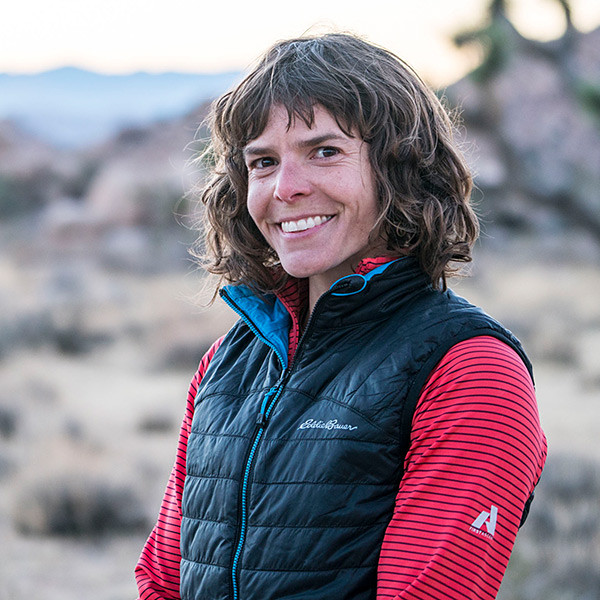
KATIE LAMBERT
Rock Climbing Guide
A free climber with a maximum strength-to-stature ratio, Katie Lambert has crushed big walls around the globe, from Yosemite and Zion to Picos de Europa and the Cirque of the Unclimbables. Trading short sport routes for legendary big walls, in 2006 Lambert migrated west to Yosemite National Park and since then has established herself as one of the world’s premier female free climbers

